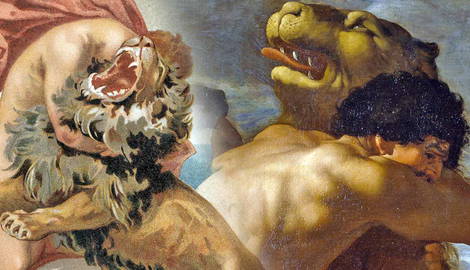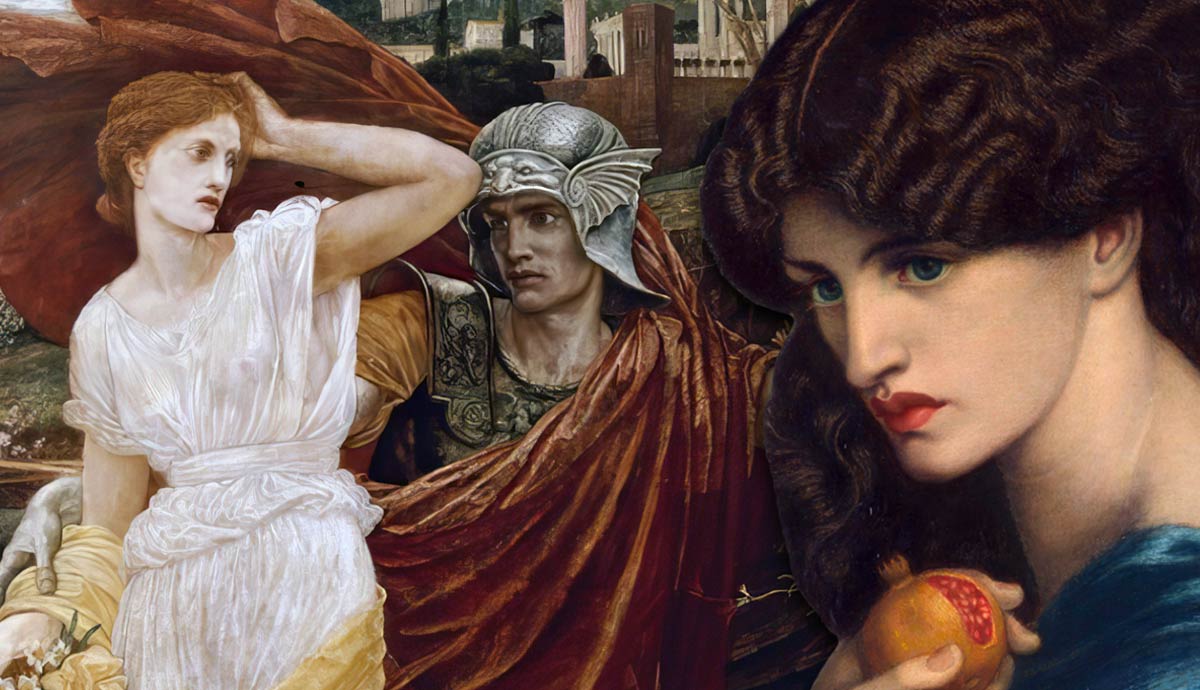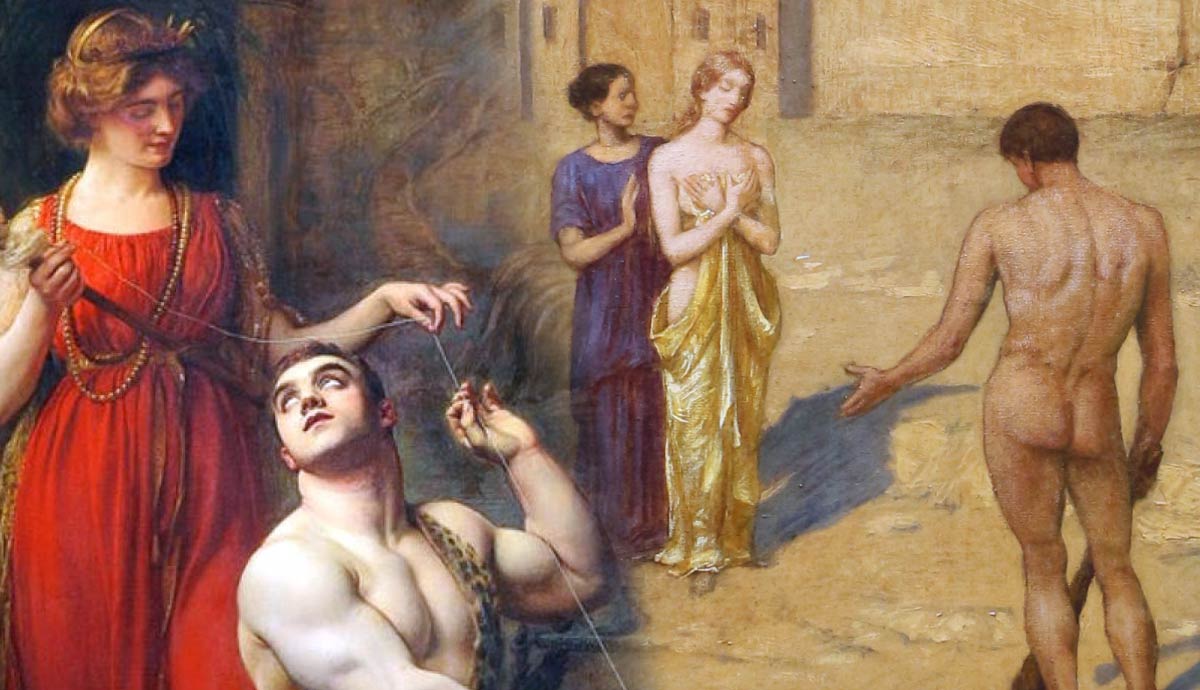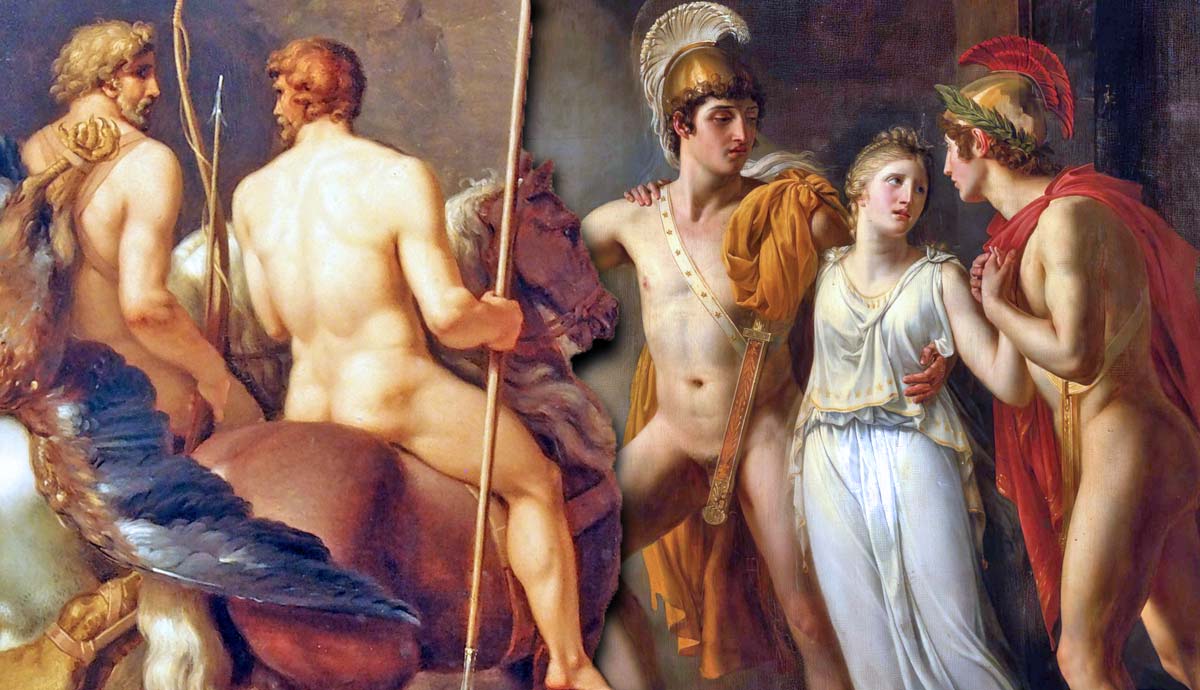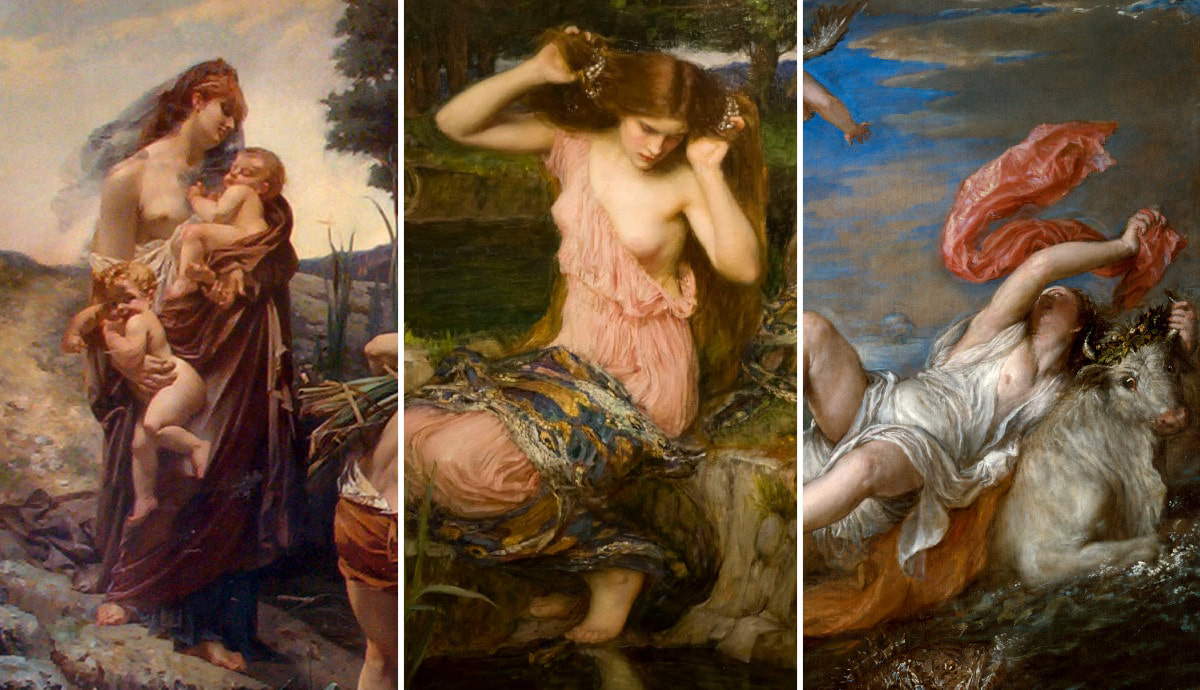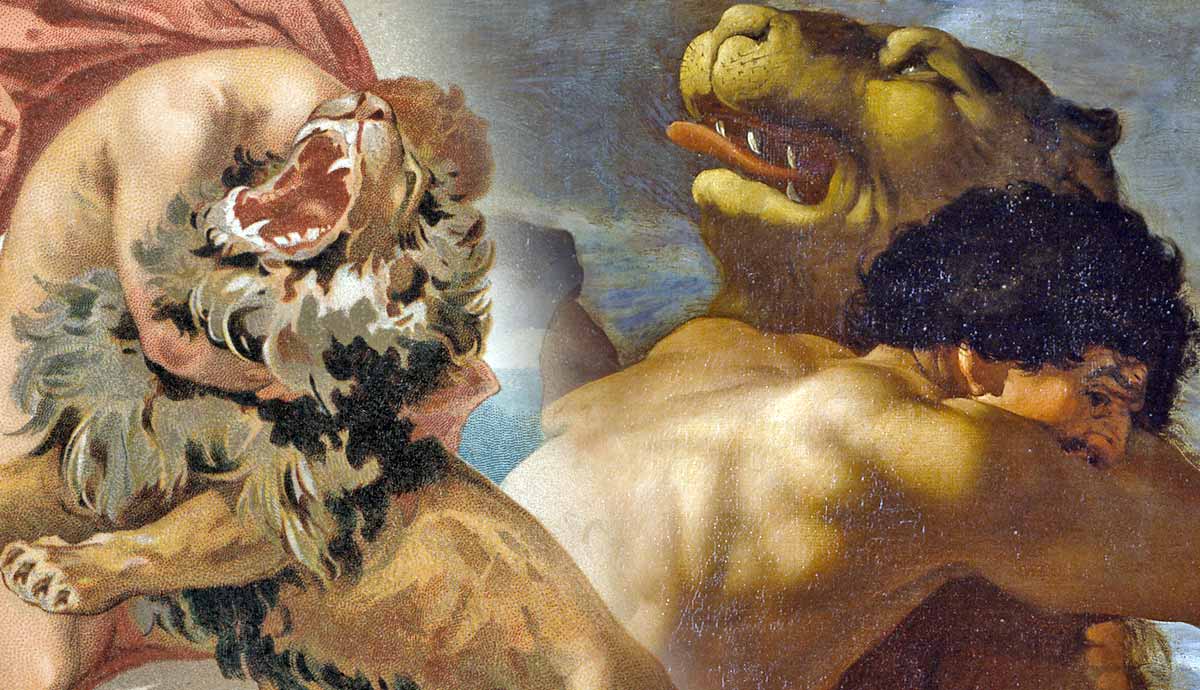
The story of Heracles is one of the most beloved and popular Greek myths. The goddess Hera cursed Heracles because he was born the son of Zeus. She tricked him into committing an unthinkable crime, which led the hero to undertake twelve seemingly impossible labors to atone for his sins. During these labors, he had to slay monsters, capture mythical beasts, and even outwit immortals. Learn about this epic hero’s origins and the tragic events that led him to undertake his first labor — the slaying of the Nemean lion.
The Birth of a Hero: The Lust of Zeus

Heracles was the son of Zeus and Alcmene, princess of Mycenae, and granddaughter of the hero Perseus. Alcmene’s beauty rivaled even Aphrodite’s, and Zeus greatly desired her. However, Alcmene was already in love with and married to another grandchild of Perseus Amphitryon, the King of Tiryns.
One day, while hunting, Amphitryon accidentally killed his father-in-law, King Electryon. Amphitryon was banished from Tiryns and sought purification from King Creon in Thebes along with Alcmene, for his crime. After Creon purified Amphitryon, the couple remained in Thebes. Before consummating their marriage in Thebes, Amphitryon vowed to avenge Alcmene’s brothers, who had died at the hands of the Taphians pirates.
During Amphitryon’s absence, Zeus saw an opportunity to seduce his wife, Alcmene. However, he knew Alcmene was in love with her husband and would not fall for his usual tricks of turning into animals or handsome shepherds. So, Zeus came up with a cunning plan — he disguised himself as Amphitryon hours before Amphitryon returned to Thebes after avenging Alcmene’s brothers.
Zeus told Alcmene about Amphitryon’s triumph, and they made love. The next day, Zeus slipped away just in time for the real Amphitryon to arrive and tell his wife the same story she had heard the previous night. When Alcmene asked why he was repeating what he had already told her, Amphitryon brushed it off as he was eager to consummate their marriage.

After a passionate night, Amphitryon and Alcmene questioned the odd discrepancies in his arrival time. They consulted an oracle, who revealed the truth — Alcmene was pregnant with twins, one fathered by Zeus and the other by Amphitryon. This rare occurrence—heteropaternal superfecundation—happens when a woman carries twins with different fathers.
Alcmene and Amphitron were thrilled to hear the news despite Zeus’s trickery. However, Hera, the Queen of the Olympians, was enraged upon learning about yet another extramarital affair by her husband. Hera was known to punish the lovers and children of Zeus’s infidelity, and it seemed that Zeus’s child by Alcmene was the final straw for her. She vowed to torment the child throughout their life for daring to exist and reminding her of her husband’s adultery.
Birth of a Hero: Cursed Before Birth

Hera’s first attempt to harm Zeus’s new child happened when Zeus announced to the Olympians that the next child born from Perseus’s lineage would become the ruler of Argolis. Hera asked Zeus to swear officially in front of everyone and guarantee that he would do everything in his divine power to ensure it.
Zeus agreed as he knew that his child with Alcmene, Perseus’s granddaughter, would soon be born. He was confident that nothing could go wrong. Another descendant of Perseus was Sthenelus, the new King of Tiryns, whose wife Nicippe was also pregnant. However, she was not due to give birth for several more months.
Unfortunately for Zeus, Nicippe, and Alcmene, Hera was the protector of women during childbirth. Hera commanded her daughter Eileithyia, the goddess of childbirth, to speed up Nicippe’s pregnancy and prevent Alcmene from giving birth. Eileithyia achieved this by sitting outside Alcmene’s room with her legs crossed.
Alcmene endured several days of painful labour, while Nicippe gave birth prematurely to a son named Eurystheus. This forced a stupefied Zeus to ensure that Eurystheus would one day rule the Argolid instead of his son. However, Hera was not done with Alcmene; she planned to let the poor woman die during her unrelenting labour, ensuring that Zeus’s son would never be born.

Hera’s plan would have almost succeeded if not for the quick thinking of Alcmene’s attendants, Historis and Galanthis. While Eileithyia waited outside Alcmene’s room, wondering when she could finally uncross and stretch her legs, she heard sounds of celebration.
Galantis swung open the doors and announced that Alcmene had given birth to two healthy boys. Eileithyia uncrossed her legs and rushed in, but she realized too late that she had been tricked when she saw Historis assisting Alcmene with the baby’s delivery. Hera was enraged and punished Galanthis by turning her into a weasel for fooling her and Eileithyia. Historis seems to have escaped punishment.
Alcmene and Amphitryon were blessed with the birth of twin boys who were quite large. They decided to name the elder twin Alcides and the younger one Iphicles. Although it was not immediately apparent to them which child was the son of a mortal and which was the son of a god, they did not have to wait long to find out.
Birth of a Hero: Hera’s Torment and Glory

Shortly after midnight, a few months following the birth of the twins, Hera devised another plot to eliminate the innocent son of Zeus and Alcmene, who had committed the unspeakable sin of being born. The Queen of Olympus sent two venomous snakes to kill the twins while they slept.
Hera, unable to distinguish which twin was the son of Zeus, ordered the snakes to poison both. A panicked Historis woke Alcmene and Amphitryon the next day, urging them to see their children. The couple rushed to their babies and were greeted by an absurd sight. Iphicles was crying and red-faced in his cradle while his brother Alcides lay on his back, happily gurgling. In his tiny fists, Alcides clutched two strangled vipers. The sight answered the question of which child was the son of a mortal and which was a god.
Alcmene and Amphitryon were worried about their children’s safety and sought advice from the blind prophet Tiresias. He told them that Alcides would face continuous harassment from Hera during his life, but he would also gain immense fame and kill many monsters. Upon hearing this, the couple decided to change their son’s name from Alcides to Heracles, which roughly translates to “Glory of Hera,” to appease and mollify the goddess.

In an alternate version of the myth, Alcmene abandoned baby Heracles in a Theban field to avoid Hera’s anger. However, Athena, the patron guide of heroes, rescued her little half-brother and devised a clever plan to safeguard Heracles and trick her stepmother.
Athena took Heracles to Hera on Olympus and presented him as an innocent orphan who needed rescue. Hera’s maternal instincts took over, allowing the baby to nurse at her breast for nourishment without realizing who she was feeding. The infant Heracles suckled so forcefully that it caused Hera immense pain, and she flung the baby off her, causing her milk to spray across the heavens, creating the Milky Way.
Hera’s divine milk granted Heracles the superhuman strength and endurance he is widely known for. Athena rescued the infant after Hera threw him and returned Heracles to Alcmene, reassuring her that he was strong enough to withstand Hera’s wrath.
Early Life: Heracles’s Youth

Heracles was raised in Thebes alongside his half-brother and best friend, Iphicles. Their parents treated them equally and provided them with an education that befitted their royal status. Their father, Amphitryon, taught them chariot driving, javelin throwing, and other gymnastic skills. Meanwhile, Eurytus, the King of Oechalia, the best archer in Greece and the grandson of Apollo, taught Heracles how to string and shoot a bow with remarkable accuracy and speed.
At the age of ten, Heracles was already proficient in chariot racing, archery, and various gymnastic sports, surpassing even the abilities of fully grown adults. However, despite his impressive skills, he also had a reputation for having a deadly temper. Heracles tended to become easily agitated, leading to uncontrollable fits of anger and he became difficult to manage.
Befitting their royal status, the twins received an education that included rhetoric, mathematics, and music training. Alcmene and Amphitryon spared no expense and hired Linus, the brother of Orpheus, to teach the twins music and dance. However, Heracles struggled with musical skills and often refused to listen to his teacher’s instructions. Linus struck Heracles with a stick during a lesson for not paying attention. This sent Heracles into a blinding rage, and he threw Linus across the room, killing him.

Despite his violent outburst, Heracles was not punished, thanks to Iphacles’s testimony that he had been unfairly provoked. However, Heracles’ reputation for having a quick and violent temper began to spread. Elumolpus, the son of cattle thief Autoculus, took over the twins’ music lessons. Meanwhile, Castor, one of the Dioscuri twins also born through heteropaternal superfecundation, trained them in weaponry and martial arts.
During his schooling, it became apparent that Heracles was skilled in physical activities but struggled with academics. Although Heracles was not the brightest star in the Milky Way, this does not imply that he lacked intelligence. Rather than relying on cunning, wit, or wisdom like other Greek heroes, his strength lay in his ability to take direct action. Heracles’ greatest strength was his actual strength as well as his confidence in his physical skills.
By 18, Heracles had become the world’s strongest, tallest, and fastest man. Many Olympians offered their support by bestowing gifts to help him prepare for a life of challenges, adventure, and warfare. Athena gave him a robe, Poseidon gifted him with exquisite horses, Hermes gave him a sword, Apollo presented him with a bow and arrow, and Hephaestus equipped him with a breastplate made of pure gold.
Early Life: Hero of Thebes

Heracles became known as a hero and protector of Thebes after he set out to defeat the monstrous Lion of Cithaeron, who had been attacking his father’s cattle and causing destruction in the lands of King Thespius of Thespiae. It took Heracles 50 days to hunt the beast, during which he stayed with King Thespius, who offered one of his 50 daughters to Heracles every night.
Heracles defeated the monster on the 50th day and fathered a child with each of the 50 daughters. In addition to slaying the Lion of Cithaeron, Heracles also led an army to defend Thebes against an attack from King Erginos of Orchomenos. Erginos and his Minyan army had long troubled the city of Thebes. Heracles defeated Erginos and returned to Thebes as a celebrated war hero.
Creon, the King of Thebes, rewarded Heracles for his services to the city by offering him his daughter Megara’s hand in marriage. Heracles and Megara were blessed with two children, a son and a daughter, whom they cherished dearly. Life was going perfectly for Heracles. He was a celebrated hero, a loving husband and father, and his marriage to Megara guaranteed that he would one day ascend the throne of Thebes.
However, all this infuriated Hera, who despised seeing Heracles living a happy life. The Queen of Olympus still hated Heracles and devised a new plan to lead him down a path of shame, torment, and eternal suffering.
The Madness of Heracles

After a typical day guarding Thebes, Heracles returned to his family villa. However, upon entering, Hera sent Heracles into a maddening rage, which would change his life forever. Heracles’s madness caused him to murder his wife and children. According to some accounts, Heracles, in his madness, mistakenly believed that his family were dangerous monsters. Tragically, he killed them, thinking that he was protecting his family.
After the delusion faded, Heracles finally saw the truth of what he had done and fell into a deep grief. This incident was one of the cruelest tricks Hera had ever played on him. In one swift move, the goddess had taken everything away from Heracles — his family, reputation, and self-respect. Overnight, Heracles went from hero to zero. Society shunned him, and he was now seen as a detestable and polluted blood murderer. Heracles could barely function due to his overwhelming grief. He wished for death, but he knew that death alone was too easy of a punishment. Before reuniting with his family in the underworld, Heracles had to suffer and punish himself for his actions.
In ancient Greece, the most heinous crime one could commit was killing a family member or blood murder. The only way to be forgiven for such a crime was to receive purification from an anointed king, oracle, or priest. If the perpetrator failed to receive this purification, the furies, goddesses of vengeance, would relentlessly pursue them until they were driven to madness. However, if one could not seek purification from these individuals, there was another option: they could attempt to cleanse themselves through voluntary exile and atonement.
Exile and Seeking Atonement

Heracles exiled himself from Thebes and sought guidance from the Oracle of Delphi. The Oracle informed Heracles that to atone for his terrible crime, he must serve Eurystheus, the King of Argolis, for ten years without hesitation and perform every task he commanded. Heracles didn’t know that Hera had enchanted the Oracle to say this. As Heracles was about to leave, Apollo, the god of prophecy, took control of the Oracle and told Heracles that if he served without complaint, he would be rewarded with immortality.
Heracles went to Tiryns, the capital of Argolis, to meet his cousin King Eurystheus. Eurystheus was Zeus’s appointed ruler of Argolis, born prematurely due to Hera’s intervention. Eurystheus and Heracles were complete opposites in every way. Heracles was brave and straightforward, while Eurystheus was deceitful, cowardly, and cunning. Although they had never met, Eurystheus deeply resented Heracles’ immense popularity, hearing many stories of his heroic deeds.
The envious King must have relished the sight of Heracles kneeling before him, awaiting his first set of instructions. Eurystheus declared that as punishment for Heracles’ unthinkable crime, he would have to undergo ten tasks for the king over ten years without any assistance or payment. Only after Heracles completed all ten tasks would Eurystheus forgive and cleanse him of his crime. Hera had instructed Eurystheus, through her priestess, on exactly how to torment and punish Heracles.
The First Labor of Heracles: The Nemean lion

Eurystheus assigned Heracles his first labor: to kill the Nemean lion terrorizing his Kingdom’s people in the Northeast. This was no ordinary lion — it was believed to be the offspring of the monstrous Chimera, Typhon, or Echidna, mother of monsters. Hesiod wrote that the lion was nurtured by Hera and was sent to haunt Nemea. The beast had a thick coat of impenetrable golden fur that no arrow, spear, or blade could ever pierce. Its razor-sharp claws could easily slice through metal like soft butter. Its mighty jaws could effortlessly bite through stone like biting into freshly baked bread.
When Heracles was told about his first labor, he remained fearless and asked if he only needed to kill the monster and not bring it back alive or dead. Heracles’ calm attitude irritated Eurystheus, who believed that the beast would quickly kill his cousin. Eurystheus angrily told Heracles that he only needed to kill the monster and did not require its body.
The Hunt

Heracles devoted several weeks to stalking and observing the Nemean lion, just as he had done while hunting the Lion of Cithaeron. After stalking the lion for some time, Heracles tried to kill it with arrows from a distance. Although his arrows hit the target, they bounced off the lion’s impenetrable golden fur. This initial attempt made Heracles realize that his weapons were useless against the lion and that he would have to rely on his strength and bare hands to defeat the beast.
Heracles may have been a man of action, but he was not foolhardy. After realizing he needed to confront the lion up close, Heracles trained for several weeks to enhance his strength. He began a training regimen by uprooting trees, running marathons, and lifting boulders above his head, which made his already superhuman strength even greater.
Heracles devised a plan to face the lion while it rested in its den. While preparing, he discovered that the lion’s cave had two entrances. Just before the final showdown, he blocked one of the entrances with boulders, preventing the lion from escaping when he launched his attack.
The First Labor of Heracles: Hero Versus Lion

With all the preparations done, Heracles crept as silently as a hulking hero could into the lion’s den. Once the monster was in sight, Heracles leaped forward and tackled the massive beast to the ground.
The lion was taken entirely by surprise. No person or beast had ever attacked the lion in this manner before. Heracles grappled the lion with all his strength, denying the beast any chance of fighting back with its deadly claws or fearsome jaws.
The fight between the hero and the lion lasted for hours, with Heracles gradually tightening his grip around the lion’s throat. Despite its impenetrable golden fur, the lion was helpless against Heracles’s mighty hold. After struggling for hours, Heracles finally defeated the Nemean lion, and it took its last breath.
Heracles then knelt before the lion’s body and paid his respects. Even though he showed no mercy to his opponents when they were alive, he did his best to honor them in death. After completing the necessary rituals, Heracles decided to skin the lion and use its impenetrable fur as armor and a trophy of his success.
Although Heracles had calmly accepted his first labor, Eurystheus’s disrespectful attitude had annoyed him. This is why he asked the King if he only wished to see the lion killed or if he had any interest in its body. This allowed Heracles to do as he pleased with the lion’s remains.

Heracles attempted to skin the lion, but neither his sharpest knife nor sword could penetrate its hide. He may have spent hours or days futilely trying to skin the creature if Athena had not appeared and offered her advice. The patron of heroes suggested that Heracles use the lion’s razor-sharp claws to skin its fur.
Following her advice, Heracles successfully skinned the creature and created a cloak with the lion’s head included. He also turned the lion’s wicked claws into a necklace. Heracles then searched for the largest oak tree, uprooted it, and stripped it of its branches to create a massive club. From that day on, he would no longer rely on the sharpness of blades or spears to defeat his enemies.

Victorious, Heracles returned to Tiryns, but his appearance had changed significantly. He wore a lion’s skin pelt over his shoulders, with the ferocious beast’s open jaws resting on his head, and he carried a great club by his side. This became Heracles’ iconic look, which would be recognized for generations.
However, this was only the first of many labors Heracles had to endure to atone for his crime. By the time Heracles returned, Eurystheus had already devised another impossible task for the legendary hero: to slay the nine-headed Lernaean Hydra.
